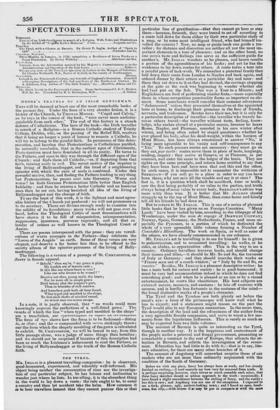3SIOORE'S TRAVELS OF AN IRISH GENTLEMAN.
THIS will be deemed at least one of the most remarkable books of the present day. Under the form of a very slender fiction, it is a history of the Church, by THOMAS MOORE. ". Cupid and Calvin," , as he says in the course of the book, "were never more undistin- .guishable from each other." The end of this history is a stanch defence of Catholicism... The hero of the book—the Irish traveller in search of a Religion—is a Roman Catholic student of Trinity College, Dublin, who, on the passing of the Relief Bill, resolves that it being no longer a point of honour to remain a Catholic, he will try to belong to the gainful faith. In pursuance of this deter- • mination, and hearing , that Protestantism is Catholicism purified, he naturally concludes, that in the earliest ages of Christianity, Protestantism must have flourished in all its purity. He turns to the Fathers, and runs in this way through the different ages of the • .Church ; and finds them all Catholic,—or, if departing from that faith, turning aside to evil. The secret motive of the • inquirer is the living. of .Ballymudragget, and the hand of a neighbouring spinster with which the cure of souls is combined. Under this .powerful motive, then, and finding the Fathers leading to any thing but Protestantism, be passes over into Germany. Worse and worse! he finds German Protestantism little better than English Infidelity : and then he returns a better Catholic and an bonester man than he set out, having banished all idea of the living of Ballymudragget and the change of faith. To. say the least of this work, it is the lightest and most agree- ,able history of the Church yet produced : we will not pronounce as to its accuracy. There are divines enough ready to examine into the solidity of its foundations: many weeks will not.pass over. its 'head, before the Theological Critics of most denominations will -have shown it to be full of misquotation, misrepresentation, suppression, ignorance, perverse ingenuity, and all that ca iendar of crimes so well known in the Theological Court of 'Assize.
There are poems interspersed with the prose : they are versifi- • cations of warm passages in the Fathers—they celebrate the "Loves of the Angels" on earth. Some of these verses are very -elegant, and deserve a far better fate than to be offered to the 'saintly album of the spinster-patroness Of the living of Bally- -mudrauget. '
Thet.fo'llowing is a version of a passage of St. CHRYSOSTOM, on -.finery in female apparel.
• "Behold," thou say'st, "my gown is plain,
My -sandals are of texture rude ;
Is this like one-whose heart is- vain ?
Like one who dresses to be wooed ?"
Deceive not thus, young maid, thy heart ; For far more oft in simple gown Doth beauty play the tempter's part, Than in brocades of rich. renown.
And homeliest garb Lath oft been found, When typed and moulded to the shape, To deal such shafts of mischief round,
As wisest men can scarce escape.
In a note, it is justly. observed, that " no words could more knowingly express the perfections of a well-fitted gown." The +words of which the line "when typed and moulded to the shape"
are a translation, are crear.xtwxruqa..v ettqattrI xxs sx7r...-vawi.eirror. The force of G..03: shows how the dress is to he fashioned—fitting to, or close; and the ix compounded with I'vvrqw, strikingly throws out the form which the shapely moulding of the gown is calculated -to exhibit. • St. Cnnysosrom, we will be bound to say, from this little passage alone, was a judge of more things than homilies ; and we should not be surprised if beauties of' this description had been as much the Irishman's inducement to read the Fathers, as the living of Ballymudragget or the truth of the Roman Catholic -faith.


















 Previous page
Previous page